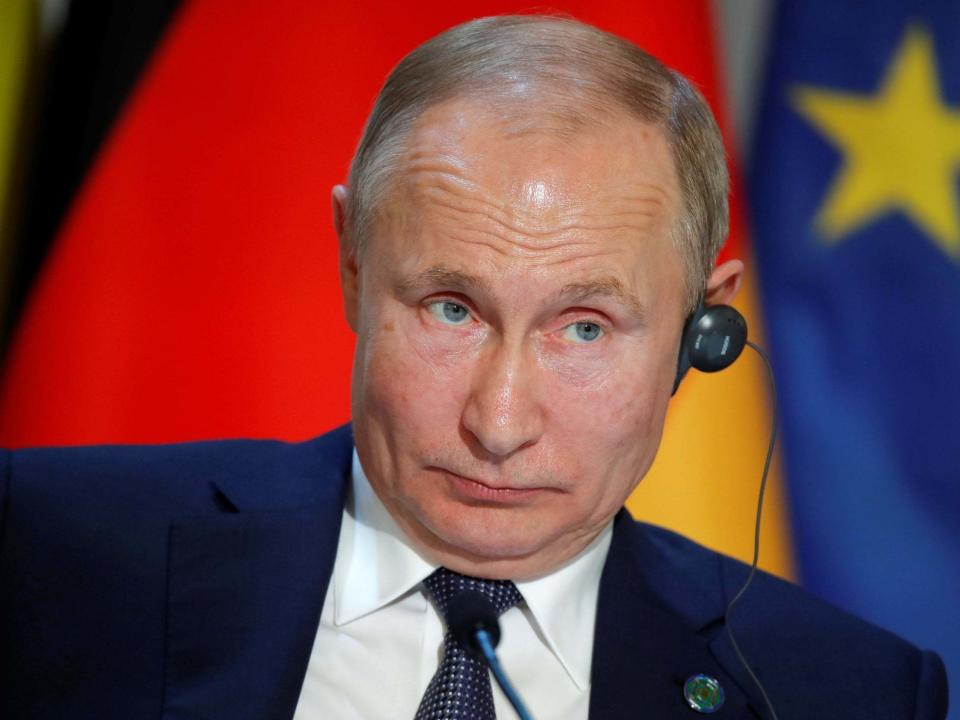Russia doping ban: Vladimir Putin confirms Rusada are considering appeal against four-year ban from sport

Russian president Vladimir Putin has confirmed that the Russian Anti-Doping Agency [Rusada] are considering an appeal against the four-year ban from major sport handed to the nation by the World Anti-Doping Agency [Wada].
Russia have been banned from representation at the 2020 Olympic Games and 2022 World Cup due to failing to comply with Wada’s conditions over their anti-doping investigation, having been reinstated to global sport last year following the 2015 scandal.
Having been found to have operated a state-sponsored doping programme in order to succeed at the 2014 Sochi Winter Olympics, Russia was banned from both the 2016 Rio Olympics and 2018 Pyeongchang Winter Olympics, with clean athletes forced to compete as neutrals under the International Olympic Athletes banner.
This latest ban – for tampering with anti-doping data that could protect up to 145 athletes who have potentially been implicated by the programme – will span the next four years unless Rusada is successful with an appeal, and will see them miss ‘major sport events’ such as the Olympics and World Cup as well as the Rugby World Cup.
But President Putin hit out at Wada on Monday and claimed the decision is “politically motivated” given that the ruling contains no complaints directed at the Russian Olympic Committee.
“And if there are no complaints against it, then the country should compete under the national flag,” Putin said at a press conference at the French presidency’s Elysee Palace. “That's written in the Olympic charter. That means that, in that aspect, the Wada decision violated the Olympic charter. We have all grounds to appeal.
"Any punishment should be individual, and should be linked to what has been done ... by one person or another. A punishment cannot be collective, and apply to people who have nothing to do with certain violations," he added.
"If someone takes such a decision about collective punishment, I think there is every grounds to suppose that the basis for such decisions is not a care about the purity of international sport, but political considerations which have nothing to do with the interest of sport or the Olympic movement.”
Wada acted after its 12-person executive committee voted unanimously in favour of imposing the recommendations passed on by its Compliance Review Committee [CRC], advising a four-year ban from hosting, bidding for and competing in major sporting events due to the presence of fake, altered and withheld data supplied from the Moscow anti-doping laboratory.
The laboratory was also two weeks over deadline in supplying the data at the start of the year, and Wada claimed that there was evidence of it still being manipulated after it was sent on to Wada’s Intelligence and Investigations team.
As a result, critics of Russia have come out in force to call for a blanket ban of all athletes from major competitions, with the United States Anti-Doping Agency chief executive Travis Tygart expressing his belief that the sanctions continue to let Russia off the hook.
"Their behaviour hasn't changed," Tygart told Reuters. "It has only gotten emboldened and become more egregious every time the global anti-doping community attempts to put a sanction in place.
"The question is – are we just going to stick our head in the sand and pretend this didn't occur and try to turn the page?
"In the Pyeongchang Winter Games in 2018 we supported a neutral process for athletes but what we've seen is that has turned into a complete charade and mockery when you have a full delegation from Russia and we know the behaviour has not changed," he added.
Read more
Russia banned from World Cup and Olympics by Wada
What we know and what we don't know about Russia's doping ban

 Yahoo News
Yahoo News 